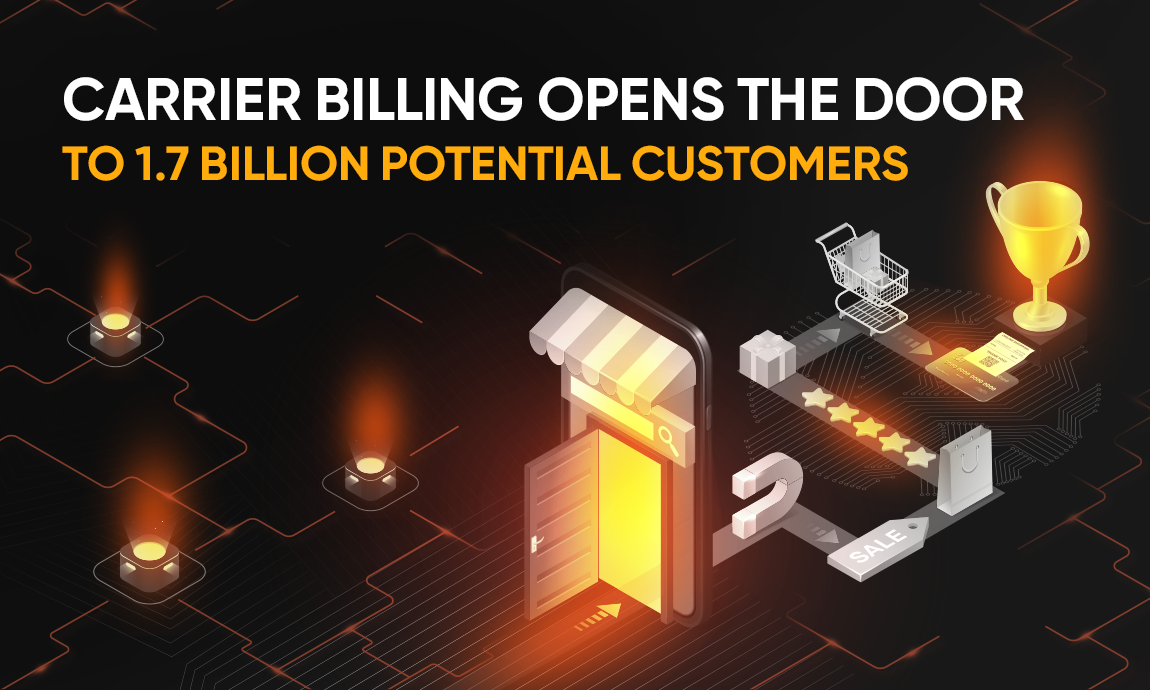
Carrier Billing won’t give you the opportunity to miss out on increasing your profit
Carrier Billing is a tool which allows digital services to cover a larger number of the target audience.
One of the most important FinTech challenges is to increase access to financial services around the world. According to research conducted by Findex data, approximately 1.7 billion adults still do not have a bank account and billions remain underserved.
Therefore, the mission of fintech specialists is to fill this gap for this segment of the population using innovative solutions. One of the measures that have already been taken was to ensure the distribution of smartphones. The wide access to smartphones combined with relevant technology solutions allows reaching a sufficient level of financial services availability.
What other measures can be taken?
Despite the fact that digital services are still considered mostly an entertainment tool, they also have a significant impact on the quality of our lives. So, we truly believe that it should not be a privilege and the whole community deserves to share the benefits of technological achievement.
Before the smartphone era, the technology of carrier billing allowed purchasing only wallpapers and ringtones. However, due to the development of smart devices, it has become possible to pay for such content as apps and tokens. This approach improves the quality of provided services and is more customer-oriented. Thus, the unbanked status deprives people of the opportunity to enjoy the privileges that new technologies can give, and businesses, at the same time, lose potential customers.
The good news is, Direct Carrier Billing can solve this problem, due to the ability to pay for digital services with no bank account.
Expanding horizons: the prospects for using Carrier Billing in the field of Digital Services
Carrier billing gives opportunities to pay for digital services in the same way as users top up their mobile phone accounts. In other words, even the unbanked population will be allowed to pay for Netflix, Amazon Prime, HBO Max and other entertainment content using prepaid payments made in cash.
This allows you to significantly expand the target audience of digital service providers.
Over the past decades, globalization has opened up limitless opportunities for e-commerce, and carrier billing helps potential customers to become a part of the consumer culture. In this case, all participants in the process will benefit. Customers will get access to the necessary content, digital service providers can attract new clients, and, in addition, mobile carriers will receive a percentage of each transaction in exchange for using this payment method.
Solution providers ensure scalable implementation of such carrier billing for telecom operators. The Direct Carrier Billing (DCB) solution provider takes the role of the agent between mobile operators and digital service providers. They perform all the work on internal integration between both sides and take all responsibility for the smooth operation of the carrier’s payment service. In other words, DCB is a «hands-off» solution for every participant in such a business process.
DCB solution plays an important role in certain ecosystems, contributing to an increase in the efficiency of both mobile operators and digital services.
The necessity of Global Capabilities for implanting Carrier Billing at scale
The growing demand for e-commerce as well as the increasing number of subscription services allow market players such as mobile operators and digital service providers to realize the importance of the advantages that can be given by technical solutions from DCB providers. This contributed to the situation where a growing number of companies offer such services. However, there is a huge gap between those who are able to operate on a global scale and companies stuck on a local level.
Convenience of use and scale are two main advantages that solution providers can ensure for their partners. Essentially, scaling capabilities are the most controversial aspect for providers, as their potential is limited due to the stagnation on the local stage. Thus, digital service providers miss out on potential profit. If we take into account the fact that most of these services operate in the global market, it could be considered more appropriate to interact with a global provider.
Let’s discuss this issue using the example of such an international streaming service as Netflix.
Due to the fact that carrier billing solutions providers have the ability to integrate globally, it means that each company can reach the international level. Thus, if a company limits interaction only to local providers, in order to expand the geography of the company’s work, they will have to attract new partners outside their region.
Such an approach will definitely lead to significantly greater material and time costs. Therefore, more internal resources will be spent on achieving a similar result. The use of minimal resources while achieving significant results is the reason why a growing number of companies choose such partners as Boku, Bango, Fortumo, and DOCOMO Digital.
What is DOCOMO Digital?
DOCOMO Digital is a direct carrier billing payment solution for telcos and merchants around the world. The company integrates more than 300 mobile carriers and 200 digital service providers worldwide. According to the statistics for 2018, the volume of e-commerce on its platform exceeded $3 billion, and it is expected that this indicator will continue to grow.
The company rightly states that scaling is a crucial factor in growth. Providing numerous value-added services is one of the fundamental factors for achieving sufficient results for DOCOMO Digital. This approach has had a particularly positive impact on mobile carriers. Such value-added services as bad debt management, detailed business analytics, and second-level customer support, contributed to a significant improvement in the services provided and increased customer loyalty.
Now we will consider one particular DOCOMO Digital case as an example. Movistar is a major telecommunications provider in Spain and other Latin American countries. Before becoming a client of DOCOMO Digital, the company integrated its own carrier billing solutions, involving numerous digital service providers in the process. Unfortunately, this led to a lot of problems, including issues regarding fees for digital services and unpaid bills. His bad debts began to accumulate, which affected the profitability of his digital business.
In order to solve this problem, the company turned to DOCOMO Digital, which integrated a customer self-service tool, which will allow maximum transparency on the users’side, as well as a billing risk manager, so Movistar can set limits on spending on digital services. These solutions led to significant improvements in work efficiency. To be more specific, a reduction in the number of debts by about 40%, requests for invoicing fell by a quarter, and at the same time, the company’s revenue increased by 20%.
Conclusion
Innovative solutions from such companies as DOCOMO Digital, Boku, Fortumo, and Bango will continue to successfully attract new partners due to the fact that the Carrier Billing market continues to grow and companies need to integrate new technologies to ensure effective business processes.







 Searching...
Searching...